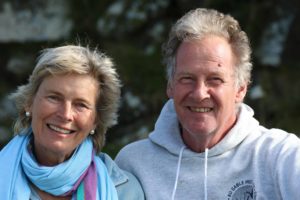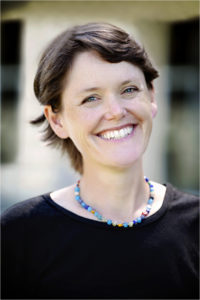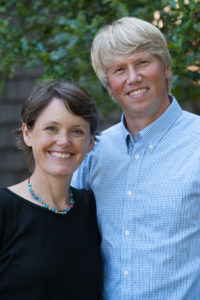“Rejoice in hope; be patient in tribulation; be constant in prayer.”
Romans 12: 12
Romans 12: 12 captures the courageous, faith-filled spirit in which A Rocha, the international Christian environmental organization, is bathed. The story of how it was founded is no exception.
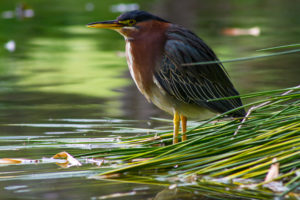 In the early 1980s, Peter Harris was an Anglican minister at St. Mary’s Church in Upton, U.K., near Liverpool, where he lived with his wife Miranda and their young children. Peter, a longtime “birder”, loved watching and taking photos of birds on the nearby River Mersey in his spare time. God seemed to be drawing the couple toward Christian work elsewhere, and at first they looked into serving in Africa with the Bible Churchman’s Missionary Society. But plans stalled, and as they waited on God’s leading, Peter and Miranda became more sharply aware of a deeply felt response to the natural world around them, which they wanted to share with others.
In the early 1980s, Peter Harris was an Anglican minister at St. Mary’s Church in Upton, U.K., near Liverpool, where he lived with his wife Miranda and their young children. Peter, a longtime “birder”, loved watching and taking photos of birds on the nearby River Mersey in his spare time. God seemed to be drawing the couple toward Christian work elsewhere, and at first they looked into serving in Africa with the Bible Churchman’s Missionary Society. But plans stalled, and as they waited on God’s leading, Peter and Miranda became more sharply aware of a deeply felt response to the natural world around them, which they wanted to share with others.
In his book Under the Bright Wings, the story of the founding of A Rocha, Peter relates some of the questions and ideas that he and his wife were working through at this time:
“Maybe by giving new thought to how important the creation was to God, we could help others to discover and value a neglected part of themselves which was part of their created humanity? Maybe as we encouraged others to give time to careful observation and study, something of the character of God would be revealed because the world is his handiwork and speaks of his nature?” (1)
These questions were brought into focus when they organized a bird watching expedition to Sweden for students in environmental studies, with the aim of exploring Biblical teaching about the natural world. A zoologist with the delightful name of Les Batty joined them on the trip. He shared his dream of establishing a Christian field study centre in the north of England, where visitors and students could observe the natural environment in a welcoming setting that gave witness to God’s creativity and call to stewardship. The seed of a very significant idea was planted.
Events proceeded rather quickly after that, culminating in Peter and Miranda and their three young children leaving for Portugal in 1983 to open a Christian field study centre there – along with Les Batty, his wife Wendy and their two children. They were headed for an area along Portugal’s beautiful Mediterranean coast where mass tourism had been threatening fragile bird habitats, and where millions of bird migrants were being trapped and shot. Here, they learned from scratch about cross-cultural evangelism, community living, and conservation. They also had to learn the language. But soon the A Rocha Christian Field Study Centre and Bird Observatory became a reality (“a rocha” means “the rock” in Portuguese), and they began welcoming visitors from all over the world. Peter and Miranda started to get a glimpse of where their early vision was leading them. Peter writes:
“As we mapped the last remaining sites of rare dune plants, or recorded the periods in which different migrants appeared in the observatory study area, we were taking notice of what God had made, coming to understand it in all its complexity, and consciously giving him the glory. Fieldwork that strives to understand God’s creation is true worship, and as such, it can have an important bearing on our lives. If we do not understand the world around us, the way we live will almost inevitably be destructive of its delicate equilibrium.” (2)
It wasn’t easy sailing. After living in Portugal for almost ten years, Peter wrote: “in the stress of the irregular hours and eccentric episodes that make up our life here, we ask ourselves how it all began, simply to find a culprit…” But they persevered.
In 1995, the Harris family moved to France and oversaw the establishment of two other field study centres. They also began to travel the world, encouraging and supporting others in the growing global movement of Christians who were active in nature conservation.
A Rocha field projects are now operational in 20 countries, making an impact in many different cultures and contexts through a wide variety of local expressions of Peter and Miranda’s original vision. Here are just a few of the current projects: restoring forests in Peru, mitigating elephant-human conflict in India, preserving rare wetland and cedar habitats in Lebanon, creating sustainable energy strategies in Ghana, and running children’s environmental clubs in the Czech Republic.
In 2008, Peter wrote another book, Kingfisher’s Fire: A Story of Hope for God’s Earth, which describes the remarkable growth of A Rocha, and how he and his family have been “almost incredulous observers of how one small environmental initiative in the south of Portugal could have given rise to a world-wide family of projects.”
A Rocha Canada
The birth of A Rocha Canada is also a marvelous tale – the story of another young couple with a deep love for God’s creation, embarking on a journey of faith.
Leah Kostamo grew up in dry and dusty Arizona, but for four magical weeks every year, her family would visit her grandparents on lush, beautiful Orcas Island, the largest of the San Juan Islands off Washington state. Those yearly pilgrimages made a big impression on Leah and her siblings. Fast forward years later to 1996, when Leah first met Peter and Miranda Harris. As part of a sabbatical year, they were teaching a course called “Incarnational Mission” at Regent College in Vancouver, and Leah was a student in the course. She admits to “falling hopelessly in love” with Peter and Miranda, not only for their engaging personalities and British accents, but also for how they lived out their faith, integrating their beliefs and their actions. Their message of how the incarnation shows God’s commitment to creation resonated with her own developing beliefs and values.
Peter and Miranda Harris met and befriended a number of people in the Vancouver area, who were also captivated by their ideas and their vision. A Board of Directors for A Rocha Canada was formed, but at first the dedicated little group’s activities happened on a small scale, such as bird walks led by volunteers. In 1999, Leah married Markku Kostamo, a biologist and outdoor enthusiast who grew up in the mission field in Nepal. Like Leah, Markku admired Peter and Miranda’s integrity, strong faith and commitment to their vision. Markku joined the Board of Directors, and soon Board members were discussing how to raise the efforts of A Rocha Canada up to a new level. One question being asked was: “Who wants to quit their job and lead this thing?”
Leah and Markku wondered if this might be their calling. With faith in God’s leading alternating with moments of panic, they made the decision to embrace the challenge. They both resigned from their jobs and began scouring the back roads and rural areas in British Columbia’s lower mainland area, scouting for potential areas to start the kind of conservation and educational work that A Rocha was doing around the world. Leah remembers those early days as being “heady, but stressful.”
One day Markku came across the Little Campbell River Watershed, and the rest, as they say, is history. Thanks to providential encounters with some very generous, far-sighted donors, ten acres were acquired – so Leah and Markku sold their home and moved to this southwest corner of B.C. with their two small children. A Rocha Canada’s first Field Study Centre opened the following year, welcoming visitors to their environmental education programs, in addition to carrying out research and conservation work on the river. As Leah puts it, “We saw God show up in amazing ways.”
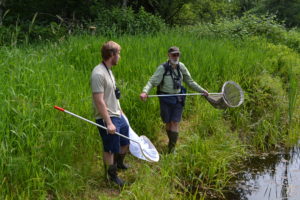 A Rocha Canada’s second Field Study Centre opened in 2005 in Manitoba’s Pembina Valley, in the heart of a rich and important oak woodland ecosystem, which is also part of a provincial park and wildlife management area. The A Rocha Prairie Centre’s unique location provides many opportunities to engage and inspire the over 10,000 people that visit the provincial park each year, as well as the 2000 schoolchildren who take part in their educational programs.
A Rocha Canada’s second Field Study Centre opened in 2005 in Manitoba’s Pembina Valley, in the heart of a rich and important oak woodland ecosystem, which is also part of a provincial park and wildlife management area. The A Rocha Prairie Centre’s unique location provides many opportunities to engage and inspire the over 10,000 people that visit the provincial park each year, as well as the 2000 schoolchildren who take part in their educational programs.
The Brooksdale Environmental Centre is the new hub of A Rocha’s work in the Vancouver area, and also serves as A Rocha Canada’s national office. The Little Campbell River runs through this beautiful 18-acre property on the edge of Surrey, B.C., which was donated to A Rocha by the Neufeld family. It is now a living classroom where people come from around the world to enjoy hands-on experiences in creation care. Every year many volunteers and Interns come to study wildlife, restore habitats, monitor species at risk, plant gardens and teach visitors. The Centre hosts conferences and retreats, and in the last five years has also welcomed more than 10,000 students on environmental education field trips.
David Anderson, who is co-director of Brooksdale Environmental Centre with his wife Shauna, explains some of the thinking behind the work of the 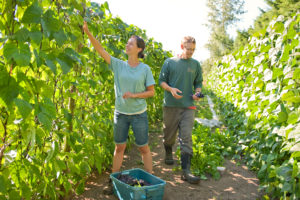 Centre: “Caring for people and caring for places are inextricably linked. When the environment is degraded, people are always degraded – and the poor and those with the least resources end up being hurt first. Ultimately, all our work in conservation biology, education, sustainable agriculture and restoring habitats is caring for people; it’s actually seeking justice.”
Centre: “Caring for people and caring for places are inextricably linked. When the environment is degraded, people are always degraded – and the poor and those with the least resources end up being hurt first. Ultimately, all our work in conservation biology, education, sustainable agriculture and restoring habitats is caring for people; it’s actually seeking justice.”
Food grown on the Brooksdale Centre’s farm is part of a Community Shared Agriculture program, with the aim of connecting people more closely to the source of their food. Since 2010, the farm has produced over 50 tons of healthy, fresh food for local families, businesses and food banks. The Centre also runs Summer Day Camps, and a program called “Farm to Families” in partnership with World Vision. In this program, kids and their families (many who are new immigrants or who are living on a low income) visit the Centre’s farm for a fun day of collecting eggs, making bread, planting gardens and exploring creation. As well, the Centre partners with churches and community groups to provide resources to facilitate the creation of community gardens.
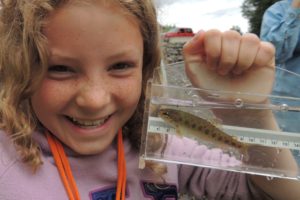 Leah and Markku and their two children still live on the land that served as A Rocha’s first field study centre. It is now called Kingfisher Farm, and lies six kilometers downstream from the Brooksdale Centre. They own Kingfisher Farm jointly with six other families. After purchasing the property, the seven families had to work out how they would live together in intentional community. They all share farm chores, have prayer times together, and eat a community meal at least once a week, but each family has their own living space. As well, they have put aside a guest space, which has been used as transitional housing for people at risk of homelessness or folks needing temporary accommodation. In response to the Syrian crisis, the group decided to open up the space to a refugee family – and in February 2016, a Kurdish Syrian family with three children moved in at Kingfisher Farm. Having lived on a farm in Syria, they are very happy to be in Canada, living in this scenic rural setting.
Leah and Markku and their two children still live on the land that served as A Rocha’s first field study centre. It is now called Kingfisher Farm, and lies six kilometers downstream from the Brooksdale Centre. They own Kingfisher Farm jointly with six other families. After purchasing the property, the seven families had to work out how they would live together in intentional community. They all share farm chores, have prayer times together, and eat a community meal at least once a week, but each family has their own living space. As well, they have put aside a guest space, which has been used as transitional housing for people at risk of homelessness or folks needing temporary accommodation. In response to the Syrian crisis, the group decided to open up the space to a refugee family – and in February 2016, a Kurdish Syrian family with three children moved in at Kingfisher Farm. Having lived on a farm in Syria, they are very happy to be in Canada, living in this scenic rural setting.
“We have eleven kids living on the farm, as well as the three Syrian children,” says Leah, “and I would say that the children have led the way in building community, just by the way they all play together. It’s been a privilege and a gift to have this family, who have suffered so much, move in with us on the farm.”
Building on the first phase of growth of A Rocha’s work in Canada, networks of volunteers are emerging across the country, in places like Calgary, Edmonton, Victoria, Winnipeg and Toronto. Most recently, A Rocha has taken root in inner-city Hamilton, Ontario, working with immigrants, refugees and those on the economic margins, bringing hope through community gardening and cooking classes. The team there is also stewarding the beautiful Cedar Haven Farm, conducting wildlife surveys and restoration projects.
Inspired by God’s love for all creation, A Rocha is transforming people and places in Canada and around the world. Leah is quick to point out that it starts with each of us taking small steps in becoming good stewards of all that God has entrusted us with. One piece of advice she offers is to become re-acquainted with the idea of Sabbath.
“So many of us think of ‘keeping Sabbath’ one day a week in very legalistic ways, perhaps because that’s how we were raised,” says Leah. “But I like to think of it as a gift of re-orientation. As a family, our Sabbath practice has been to unplug from the dominant cultural message of “you are what you consume” once a week. We try not to shop, we try to stay away from screens, and we try to get outside. I’ve been very influenced by a book by Abraham Heschel called The Sabbath. He talks about how the Sabbath is like a window into eternity – and if we don’t take one day a week to do things a little differently, we’re going to miss the chance of looking into that window.”
In 2013 Leah wrote her own book, entitled Planted: A Story of Creation, Calling and Community (Cascade Books). With charming candor and humour, it recounts the twists, turns and lessons learned in Leah and Markku’s remarkable adventures establishing the first Christian Environmental Centre in Canada.
In her book, Leah also expresses her gratitude to Peter and Miranda Harris. She speaks for many when she thanks them for having the “audacious vision to start a bird observatory on the Portuguese coast all those years ago; and also for having the courage to allow A Rocha to grow into the big, beautiful, multicultural thing it has become.”
- Harris, Peter, Under the Bright Wings (Regent College Publishing: 2000) 37.
- Ibid, 119.
Images courtesy of A Rocha Canada
Visit A Rocha Canada for more information, to volunteer, or to support their efforts.
Check out A Rocha International’s many worldwide projects.
A Rocha Canada: Inspiring Hope; Caring for Creation:
A Rocha Hamilton; Reaching out to immigrant families:


